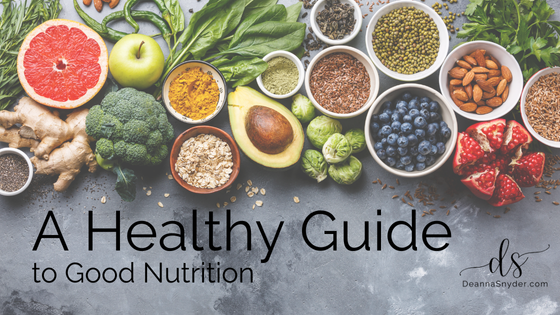A Healthy Guide to Good Nutrition
Monday February 8, 2021

How you fuel your body is the foundation of lifelong health and vitality. A balanced and minimally processed whole food diet complemented by the right nutritional supplements provide the essential macronutrients, vitamins, and minerals your body needs to function at its peak. Whether you get these nutrients or not directly impacts the other components of healthy lifestyle behaviors. Proper nutrition provides the energy for daily exercise and recovery. It can help sustain proper rest habits, regulate stress levels, reduce the toxins we consume, and support the proper function of our body systems. These benefits help maintain our long-term health so that the need for self-care and medical attention is minimized.
Whether you are at your ideal weight or striving to reach your weight goal is it simply a matter of burning more calories than you take in? The answer, I suggest, is no! Overall body health improvement, as well as weight gain or loss, must be factored into the equation or you could be heading for problems. Correct nutrition can help to reduce the risk of a myriad of health-related problems, the most frightening of which are surely heart disease and cancer. Proper nutrition, however, entails eating many different foods, monitoring your consumption of some food and beverage items, and counting calories. Good meal plans offer balanced nutrition that reduces cholesterol, blood pressure, and helps with weight control.
To function properly, your body must have the correct combination of nutrients:
Carbohydrates. They are the primary source of ammunition in your diet. The body uses carbohydrates to build glucose which can be used immediately or stored in your body for later. Too much glucose, however, is stored as fat. There are two types of carbohydrates - simple and complex. Sugars are simple carbohydrates. Starches and fibers are complex carbohydrates.
Proteins. Proteins help your body build and maintain muscles and other tissues. They also function in the creation of hormones. Like carbohydrates, excess protein is stored as fat.
Animal and vegetable are the two major types of proteins. Too much animal protein can cause high cholesterol, as it is high in saturated fat.
Fat. Strange as it may seem; fat is another nutrient your body requires. It comes in both saturated and unsaturated forms. Saturated fat puts you at risk of health problems. Unsaturated fat is healthy, but if it goes through any type of refinement process, it can become saturated fat. Our brains need fat to survive! Good unsaturated fats help satiate one's cravings and are healthy.
Vitamins. These are also required nutrients. Different vitamins perform different tasks within the body. They can work with the metabolism to help with energy levels for any task you can think of that you need your body to perform. It has also been noted that certain vitamins can prevent disease.
For example, vitamins A, C, and E, also called antioxidants, can assist with the prevention of coronary artery disease by keeping build up from occurring on artery walls. Vitamin B-1 is needed for digestion and proper nervous system function. Vitamin B-2 is needed for normal cell growth. Vitamin B-3 helps to detoxify your body. Folic acid assists with the production of red blood cells. Vitamin D assists with the absorption of calcium and is good to help boost your immune system. Vitamin K helps your blood clot.
Minerals and trace elements. These are another nutrient your body requires. Both are used in many different body processes. Phosphorus helps build strong bones. Both can be found in the foods we consume, but with a trace element, your body just needs a tiny amount. Salt is another nutrient your body requires. Healthy salt added to your diet is beneficial. Salt from highly processed foods is not beneficial. You should not consume more than 2400 milligrams per day, though, as it might raise your blood pressure.
Fiber-rich fruits, vegetables, and whole grains should be a regular part of your diet as should potassium-rich foods.
Beverages. Look at what you are drinking. Most Americans can drink several hundred calories in sodas, diet sodas, specialty coffees, and so on. Alcoholic beverages should only be consumed in moderation.
Individuality. Everyone is different. One meal plan may be good for some, and not for others. Know your body and experiment on what your individual needs are. Eat the rainbow! Have colorful fruits and vegetables on your plate. A good rough guide is to eat as many different colors as possible, this will help you to select from all five vegetable subgroups at least four times per week.
I have found that doTERRA's Nutrition line and supplements help me augment my diet and balances my nutritional needs. If you need help, reach out to me and I'll be happy to assist you along your journey.
Excellent nutrition is the basis of a healthy diet.
Until the next time,
🌿Be Well, de😊
â˜®ï¸ Peace. 💚 Love. 💦Oils.


